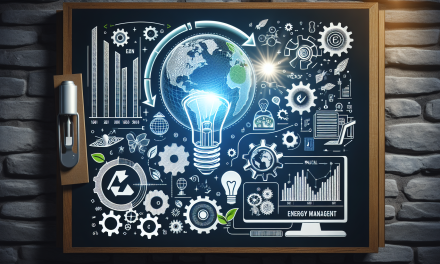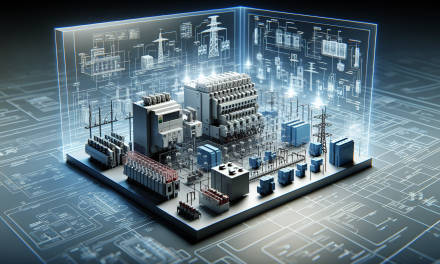Table of Contents
- Introduction
- Understanding Power, Electricity, and Industry Infrastructure
- Key Topics Covered
- Practical Application of Knowledge
- Unlocking Insights into Renewable Energy
- The Benefits of Your Learning Experience
- Frequently Asked Questions
- Conclusion
Introduction
In today’s fast-paced and ever-evolving industrial landscape, professionals require a robust understanding of power systems, electricity management, and the infrastructure that supports industries. Gaining in-depth knowledge in these fields provides a solid foundation for those looking to enhance their careers. By engaging in a focused learning experience, individuals can significantly boost their expertise and operational efficiency.
Understanding Power, Electricity, and Industry Infrastructure
The world of power and electricity is not just about the generation and consumption of energy; it encompasses a variety of complex systems and processes. Within this realm, understanding both traditional and renewable energy sources, distribution methods, and infrastructure design and management proves essential. Therefore, professionals in the sector must prioritize keeping current with industry trends and innovations.
Importance of Power Systems
Power systems function as the backbone of modern infrastructure. Grasping the intricacies of these systems allows professionals to optimize energy use while ensuring sustainability and efficiency. Additionally, understanding electrical designs encourages the implementation of cutting-edge technologies that pave the way for smarter industrial practices.
Electrical Infrastructure and Its Impact
A well-designed electrical infrastructure serves not just as a means to deliver power but also enhances safety and reliability. By focusing on best practices in electrical design and management methodologies, professionals can mitigate risks associated with energy consumption. As a result, organizations experience fewer outages and enhanced operational performance.
Key Topics Covered
Diving deep into specific topics allows individuals to strengthen their knowledge base in measurable and impactful ways. Engaging with detailed content covering subjects such as energy management systems, electrical power analysis, and industrial infrastructure can illuminate paths to innovation.
Energy Management Systems
Learning to implement energy management systems effectively, including those compliant with standards like BS EN 16001 and ISO 50001, equips professionals to streamline energy use in their organizations. Consequently, businesses not only achieve cost savings but also contribute to sustainability efforts.
Power Systems Analysis and Design
Understanding the fundamentals of power systems analysis plays a crucial role in developing efficient networks. Mastering these concepts allows professionals to assess power flow, identify potential overloads, and devise solutions to enhance stability. Explore further insights here: Mastering Electrical Power Systems Analysis and Design Essentials.
Practical Application of Knowledge
Adapting theoretical knowledge to real-world scenarios provides significant value. Hence, professionals gain opportunities to put their learning into practice, benefiting their organizations by enhancing processes and decision-making skills. Applying knowledge in various contexts enables continuous learning.
Innovative Strategies for Sustainable Energy
As the demand for renewable energy surges, industries seek innovative solutions to integrate these resources efficiently. Understanding how to navigate challenges related to renewable energy integration ensures professionals can contribute to sustainable practices in their workplaces. Learn more about overcoming challenges in this field through this insightful article: Overcoming Renewable Energy Integration Challenges: Effective Strategies for a Sustainable Future.
Case Studies and Real-World Applications
Through engaging with case studies and real-world applications, individuals can witness the impact of their knowledge firsthand. From successful renewable energy projects to innovative infrastructure designs, these studies give insights into best practices and lessons learned.
Unlocking Insights into Renewable Energy
The transition towards renewable energy is crucial for achieving a sustainable future. Exploring various energy sources and understanding their potential impacts can help professionals make informed decisions in their organizations.
Benefits of Renewable Energy
Adopting renewable energy sources not only reduces environmental impact but also promotes energy independence. Organizations embracing renewable practices tend to see improved public relations and compliance with regulations. To deepen your understanding, check out this resource: Exploring the Impact and Benefits of Renewable Energy Sources in Today’s World.
Critical Challenges in Renewable Energy
On the flip side, integrating renewable energy sources poses challenges that require strategic solutions. Addressing these issues head-on is essential for professionals looking to drive positive change within their organizations.
The Benefits of Your Learning Experience
Engaging in this enriching experience not only broadens one’s perspective but also builds valuable skills crucial for success in the industry. By participating in a focused learning environment, professionals connect with like-minded individuals and industry experts.
Networking Opportunities
Networking stands out as one of the major advantages of this focused learning experience. Collaborating with peers and industry leaders helps forge lasting relationships while laying the foundation for future collaborations.
Professional Development
Ultimately, this journey offers immense professional development opportunities. Awareness of cutting-edge practices and technologies equips professionals to tackle the evolving challenges present in the energy and industrial landscape.
Frequently Asked Questions
What expertise will I gain from this experience?
Expect to gain extensive knowledge in energy management systems, electrical power analysis, and innovative infrastructures. Each of these topics builds upon the skills necessary for enhancing an individual’s professional capabilities.
How can I apply what I have learned in my current role?
Utilizing the knowledge gained will help improve energy management practices, foster new project ideas, and contribute positively to organizational performance. Whether it’s optimizing power distribution or implementing sustainable practices, the possibilities for application are numerous.
Are there any online resources I can access?
Absolutely! There are several valuable resources available online. For instance, check this insightful course: 5-Day Mini Master Electrical Power & Industrial Infrastructure Course. Additionally, explore the articles listed throughout this post for further reading on topics related to renewable energy.
Is networking a significant part of this learning journey?
Yes, networking plays a pivotal role! Engaging with professionals from various backgrounds opens doors for collaboration and knowledge-sharing that extends beyond the learning experience.
Conclusion
In conclusion, embracing a focused path towards understanding power, electricity, and industry infrastructure serves as a foundational step for career advancement. With the right knowledge and skills, professionals in this dynamic field can drive progress and contribute to sustainable practices. Explore further insights and embark on your journey today!





